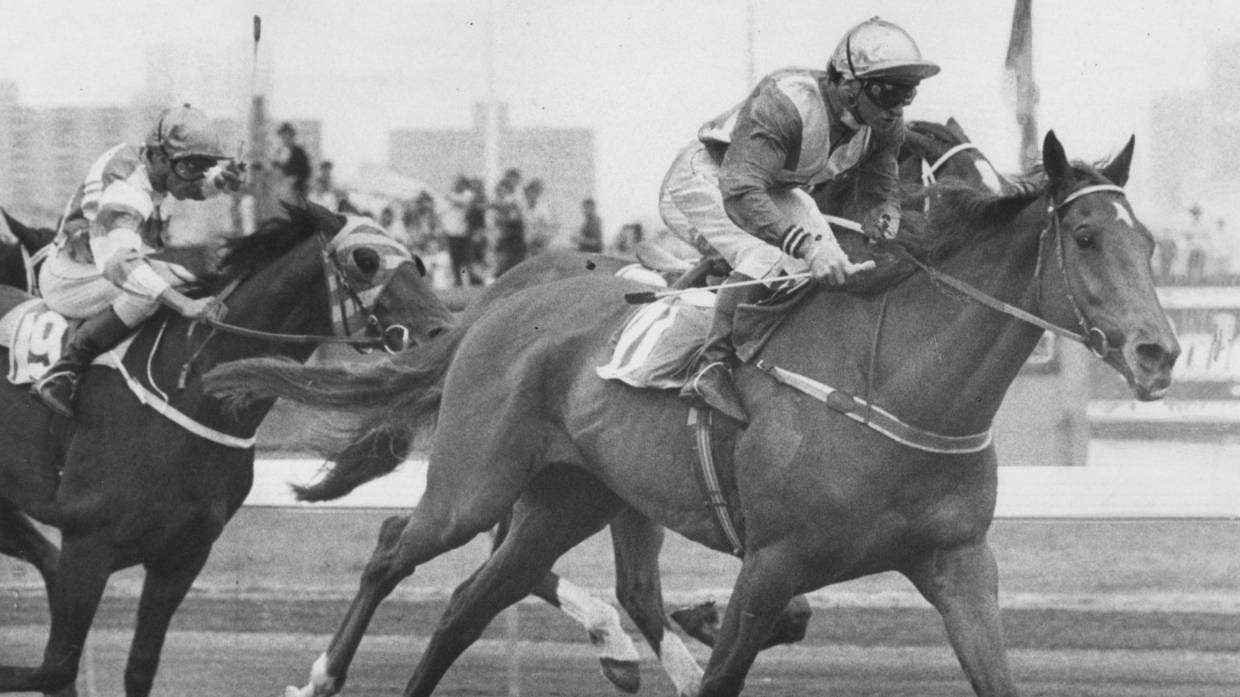“… and Kiwi is last of all”
0Tomorrow is the first Tuesday in November, and with it the 163rd running of the Melbourne Cup at Flemington. It’s long been “The Race That Stops A Nation”, but 40 years ago was the point at which it became the race that stops two, as on an overcast day a stayer from a sleepy South Taranaki town produced one of the iconic moments in the races long history.
Before 1983, New Zealand success in the Cup had been limited, especially for horses that were trained and run here; Even Stevens in 1962, Silver Knight in 1971, Van Der Hum in 1976 after an afternoon downpour soaked the track, while in 1982 Gurner’s Lane had broken Aussie hearts by edging cult hero Kingston Town, but generally the cost and logistics of getting a horse across the Tasman had deterred all but the most determined.
One who fitted that later category was a trainer and farmer from Waverley called Ewen Lupton – “Snowy” to everyone – and his prized horse; a bay gelding named Kiwi that had cost him and his wife Anne $1000 to buy and who’s training regime included rounding up sheep and cattle on the family farm. Winning the Wellington Cup at Trentham that January provided the impetus, and Lupton took the plunge to take Kiwi to the biggest race in Australasia.
So, to the race itself. Kiwi had been drawn in the inside barriers and had onboard a 20-year-old jockey from Wellington by the name of Jim Cassidy. He jumped well, but Cassidy immediately pulls him to the back of the field as the Tommy Smith-trained Combat bolts out to take up the running. Commentator John Russel rattles through the field as they go past the post the first time, ending with “…and Kiwi is last of all.”
The field heads down the river straight towards the halfway point, and Russel calls the field a second time…
“…and Kiwi is last of all.”
By now Bianco Lady has joined Combat five lengths clear, and Kiwi is at least 30 lengths away at the rear. As they round the top turn Russel goes through the field once more, finishing as they pass the 1000m mark, “and a good long way back is Kiwi” with only the lame Amarant, who was being pulled up, behind him.
It will be fully 50 seconds before Russel mentions him again.
The two pacesetters quickly drop back through the pack and by the 250m it’s settled down to a three-way slog between Combat’s stablemate and race favourite Chiamare, Noble Comment, and the Bart Cummings-trained Mr Jazz. As they pass the famed clock tower Chiamare drops back leaving just two, but then on the outside there’s a horse with its jockey clad in blue and white flying home….
It’s Kiwi, and he flashes past Mr Jazz and Noble Comment to win the race to the line by a length-and-a-half as Russel calls “Kiwi! Kiwi will beat them all it’s come from last! Kiwi! Kiwi has won the Melbourne Cup, a blistering performance.”
As the racing media sought to get on the story the first problem was finding Lupton himself, as in true fashion he’d “nipped out the back” for a moment. Cassidy stuck to his lines, knowing that he’d “expected him to sprint like that” but also understatedly acknowledged “that it was the greatest race I’ve ever had”, and everyone got their head around how horse could finish like that and had won without previously racing in Australia, much less at Flemington.
But how had they done it? At the 800m Kiwi is two lengths off the horse in front and four from the one ahead of that, and still at the back as the camera pans to the leaders. The only indicator of where he is is Cassidy’s white cap as he steers Kiwi left towards the rail to get through one bunch of tiring horses, then back to the right to get around a wall of five others nearing the clock tower. He’s still four lengths away at this point but now in clear air and bursts past to win. It’s a mazy run that goes unnoticed watching it for the first time, but a thing of beauty when looking at it a second time.
Cassidy would parlay his win into a long and successful career in Australia, claiming a second Melbourne Cup onboard Might and Power in 1997, and in 2013 and almost thirty years to the day would become the third jockey to reach 100 Group One wins when he took Zoulstar to the Coolmore Stud Stakes.
Kiwi would go back to Melbourne three more times. The following year he would be controversially scratched before the race by the vet despite Lupton’s protests, which coming in the years after the Underarm Incident had elements of Aussie skullduggery about it. He would run 13th in 1985, before raising hopes in 1986 of a repeat as a 10-year-old when he came storming home down the outside in classic fashion to run fourth to At Talaq.
Retired the following year, Kiwi died in 1995 and is buried on the Lupton farm with a headstone that simply states “Kiwi, 1983 Melbourne Cup”, while two months ago a life-sized bronze statue of Kiwi and Cassidy was unveiled in Waverley.
A fitting tribute to the small-town horse that delivered one of New Zealand sport’s biggest moments.
Follow Scott on Twitter

